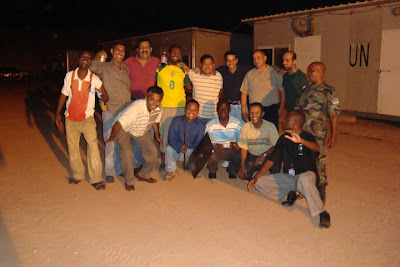In January 2008, I was one of the 11 AFP officers who served as United Nations Military Observers in the war-ravaged southern states of Sudan . Sending peacekeeping forces and military observers is part of our country's international commitments.
Prior to the actual deployment, UNMOs are given a 2-week training at the UN Force Headquarters. This photo was taken during our training in the United Nations Mission in Sudan (UNMIS) headquarters in Khartoum.
Prior to the actual deployment, UNMOs are given a 2-week training at the UN Force Headquarters. This photo was taken during our training in the United Nations Mission in Sudan (UNMIS) headquarters in Khartoum.
My duty assignment was in Unity State in South Sudan, it is about a hundred kilometers south of the invisible line that divides the north and the south. After a 2-hr plane ride from Khartoum, I was seated comfortably inside the spacious MI8 Chopper which brought us to our final destination,
After an hour of bumpy ride over swamps and endless Savannah, I arrived in Bentiu town, the home of various African tribes including the dominant Nuwer and Dinka clans.
The UNMOs of TS Bentiu
There were 32 Military Observers in our Team Site. I was assigned to Sub-Team 'Bravo' composed of military officers from different countries (L-R: Romania, Kenya, Yemen, Philippines, Germany, Greece, Peru).
During patrols, at least 4 UNMOs travel together unarmed. We assume different roles such as being drivers, navigators, Patrol Leaders and Communicator (radio man). A local interpreter joins us in our travels. In most occasions, we were also accompanied by representatives from both the government and the rebel side.
This is my photo with the UNMOs during our visit on a rebel camp (Southern Peoples' Liberation Army). The representative of the Sudanese Armed Forces is the leftmost guy (seated); and the SPLA representative is seated to my right.
I used my basic diplomatic skills by presenting a token to the most senior SPLA Commander General Chol Thon.
This is the normal sight during patrols. Most of the people here are cattle raisers, some of them are nomads who come from neighboring states of northern Sudan. The conflicts over grazing areas sometimes result to deadly clashes among different tribes.
These are Dinka children whom I met along the way. Most of them survive through fishing.
Local children were so happy seeing a digital camera for the first time. The small hut in the background is the Sudanese version of a 'sari-sari' store.
UNMOs always travel in two vehicles. When we are hours away from the base, we normally solve our problems using all available means.
These are the temporary shelters used by internally displaced persons (IDPs). These are the people who were driven away from their homes due to armed clashes.
Most of the Sudanese people are potential basketball players with an average height of around 6 feet. I met this policeman during one of my patrols.
It was our job to help resolve their problems through peaceful means. During this meeting, I experienced drinking what is truly called 'fresh cow's milk' for the first time. The nomads extracted the milk from the cow in the background and passed the container for all of us to drink. I realized later that they have never heard the term 'pasteurization'.
This is a typical accommodation for the UNMOs. Normally, we rotate in preparing our meals. This is our dinner photo during the time when I helped prepare beef steak (Pinoy bistek). Our Malaysian friend was in charge of preparing steamed rice.
Inside the Team Site, we also have a cafeteria where we can avail of food that is prepared by a well-trained cook. We were lucky that the manager was a Zamboangueno. We immediately established the so-called 'Pinoy mafia' composed of 4 PNP officers, 2 military officers, one UN Volunteer and the UN cafeteria manager.
This is our photo during New Year 2009. We enjoyed a simple party up to midnight with all available UNMOs inside the camp.
When I briefly served as Team Site Commander, my fellow UNMOs gave me full support and continuous encouragement.
It was in July 2011 that South Sudan finally became a free country. I am proud to have served in this part of the world, helping solve some of their problems.
CNN Photo
























No comments:
Post a Comment